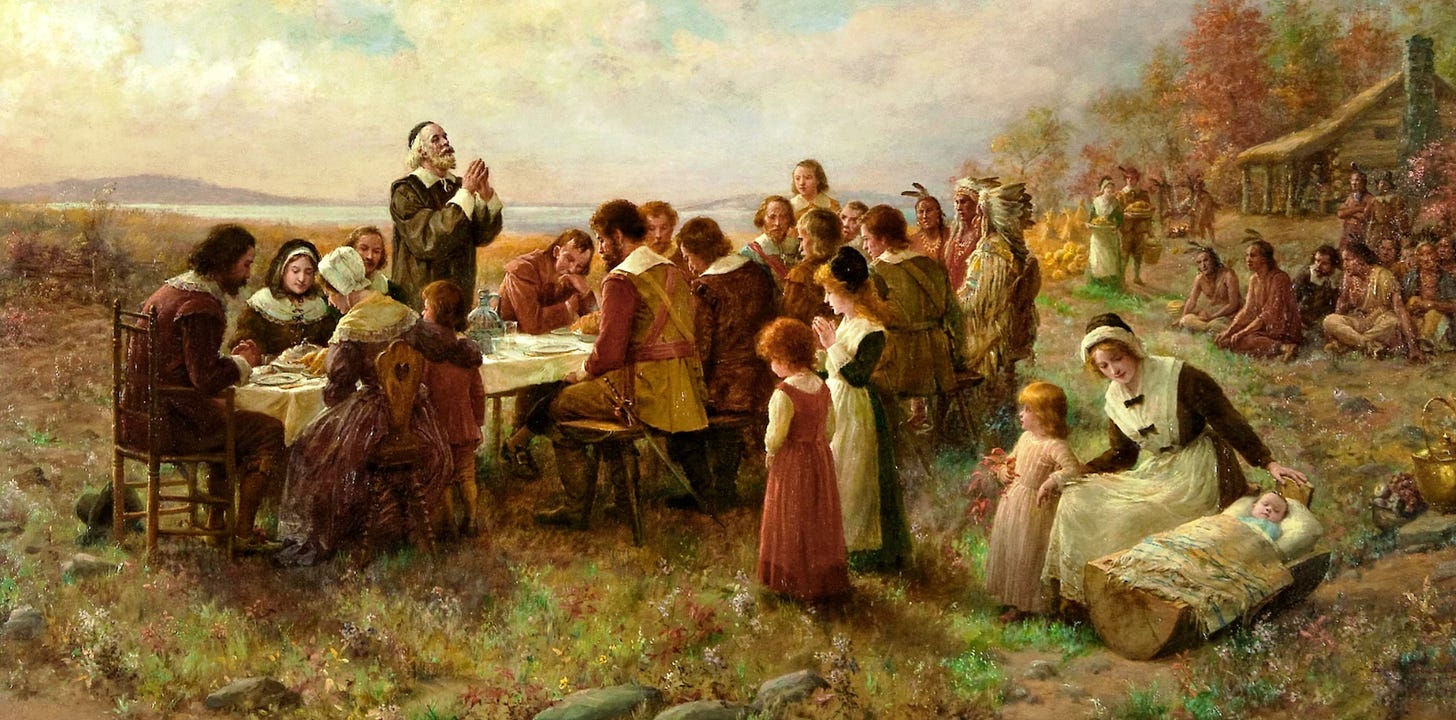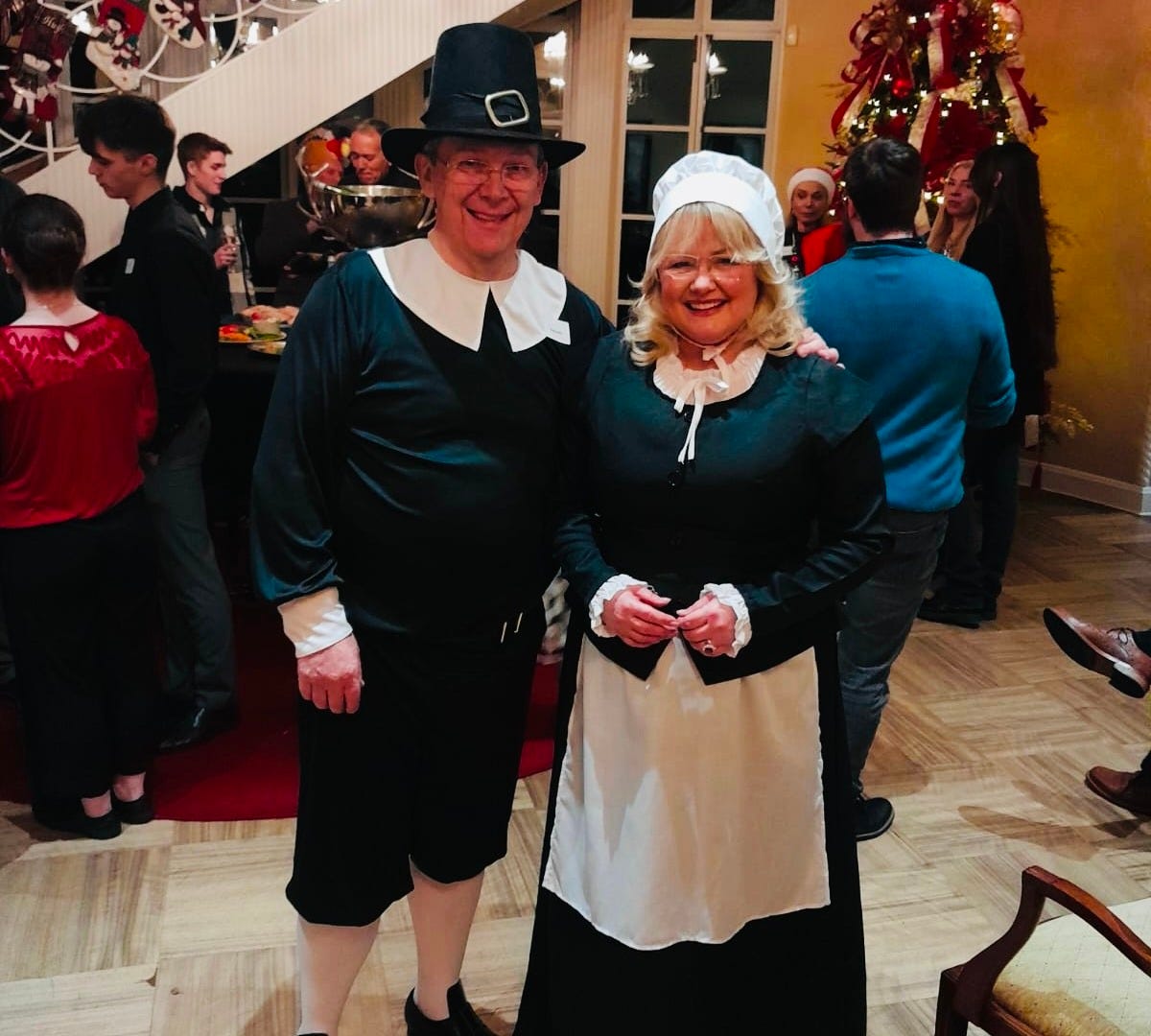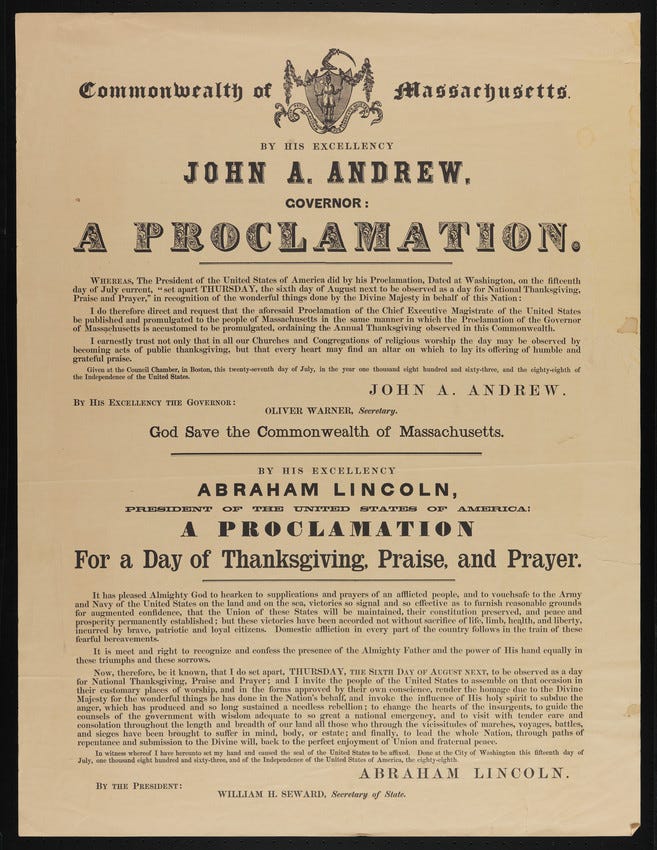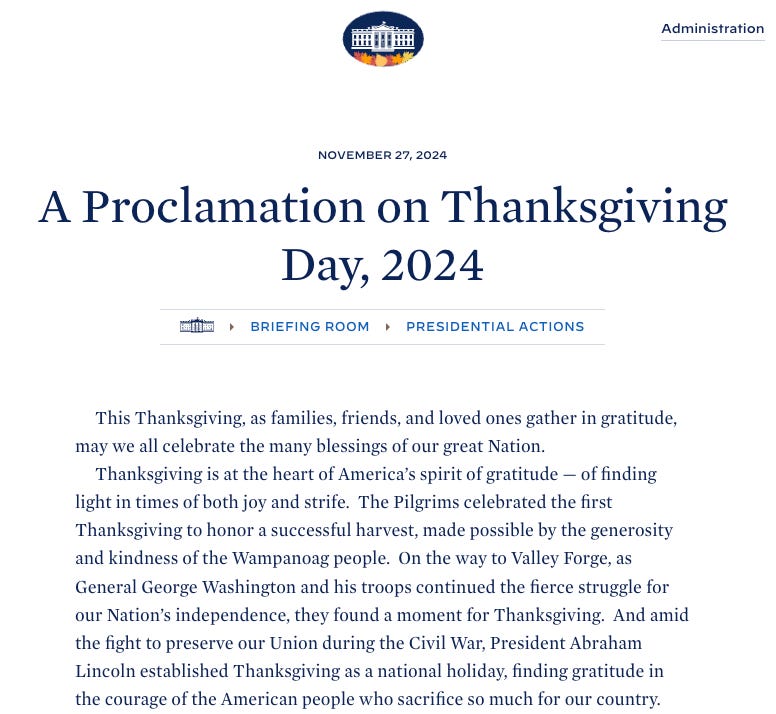The Christian Origins of the Holiday, Scotland stories, and Presidential Proclamations.

The First Thanksgiving at Plymouth, 1914, by Jennie Augusta Brownscombe. Public Domain.
Happy Thanksgiving, everyone!
As we come together to celebrate this distinctly American holiday, I’d like to reflect on a few memorable Thanksgiving moments from the past two years in Scotland, as well highlight interesting differences between the presidential proclamations of Abraham Lincoln of 1863 and Joe Biden of 2024.
First, let’s go back to 2022. Kenneth and I decided to invite both our Scottish and American friends over for a festive meal at our home. Everyone brought a dish, creating a delightful feast that truly embodied the spirit of togetherness. In a fun twist, Kenneth and I dressed as pilgrims—he definitely deserves a gold star for his willingness to keep a happy wife! We spent the evening feasting, laughing, and sharing stories, with moments of prayer woven throughout the night. To top it all off, we ended our gathering around the piano singing hymns and folk classics. We finished with a rousing rendition of John Denver’s “Country Roads, Take Me Home.” They all knew the song. I had no idea the Scots loved American country music so much.

Now, let me share a remembrance from 2023
We were invited to a Thanksgiving dinner in the Scottish Highlands, surrounded by both new and old friends. As the host welcomed everyone, he shared his thoughts on what he called the three most important F’s of Thanksgiving: family, food, and football. His reflections were personal, engaging, and often humorous, creating a warm, sentimental atmosphere reminiscent of an old Hallmark movie (if you know, you know).
Yet, as I listened, I couldn’t help but feel a sense of emptiness. The spiritual and historical truth about Thanksgiving was conspicuously absent. While his words painted a charming picture of the holiday, they lacked the deeper meaning that comes from its Christian roots.
After his remarks, the host opened the floor to any thoughts or comments from the group. Little by little, a battle waged in my mind. Should I simply smile, nod my head, or, if given the chance, should I speak up?
I hesitated – counting the customary 8-10 seconds that felt like an eternity before I finally spoke up. After checking in with Kenneth who gave me a smile of support, I raised my hand—about as high as a Presbyterian does on a Sunday morning—and shared that for me, there is a fourth ‘F’: faith. It is this faith, along with gratitude to God, that truly completes the celebration.
I can’t remember every word, but the essence was Thanksgiving, at its core, is a celebration of God’s providence and grace. It’s about acknowledging the struggles faced by the Pilgrims and the Native Americans who came together in 1621 to give thanks to God for their survival after a challenging year. Without this faith element, the essence of Thanksgiving feels incomplete, as though we are celebrating without recognizing who we are truly thankful to.
As Puritan leader William Bradford wrote, “They knew they were pilgrims, and looked not much on these things, but lifted up their prayers to God.” This gathering was more than just a meal; it was a heartfelt acknowledgment of God’s provision, echoing the biblical teachings that emphasize the importance of gratitude. It was about community, sharing, and prayer. On the tail end of my remarks, another American from Texas spoke up and shared a number of Bible verses. Between the two of us, there was a witness for Christ. And I happy to say that everyone else listened graciously and some even nodded in response.
Thanksgiving’s message of gratitude is more relevant than ever. Scripture, like 1 Thessalonians 5:18, reminds us to “give thanks in all circumstances,” encouraging us to recognize God’s presence even in tough times. Don’t just have the turkey, know the truth – and be willing to make a stand for Christ. The Lord is with you. You can do it. And we must.
Yet see how far our nation has moved from the original meaning, take a look at the Presidential proclamation of President Abraham Lincoln from 1864 and the Presidential proclamation of President Joe Biden from 2024.

Read the full 1864 proclamation at The American Presidency Project here.

Read the full 2024 proclamation at whitehouse.gov here.
President Lincoln’s proclamation emphasizes a profound connection to God, highlighting His blessings and our moral responsibility to express gratitude.
President Biden’s address focuses on the virtues of gratitude and being a good neighbor, yet it notably lacks a direct acknowledgment of our historic connection to God. While he encourages community and service, his message leans toward broader values rather than a specific call to faith which is the intangible essence of Thanksgiving.
As the scriptures say: “Unless the Lord builds the house, those who build it labor in vain” (Psalm 127:1). Our true strength and unity come from divine guidance.
To deepen the spirit of Thanksgiving, focus on its spiritual significance. Set aside time for prayer and reflection, and consider incorporating scripture readings or personal testimonies during gatherings to enhance your appreciation for blessings.
Embodying Thanksgiving also means reaching out to those in need. Volunteering, organizing food drives, or sharing your abundance reflects Christ’s call to love our neighbors.
As Kenneth and I wish you a joyful Thanksgiving, we encourage you to look beyond the feast. Take a moment to reflect on your blessings and offer thanks to God. As Psalms reminds us, “It is He who made us, and not we ourselves.” Let’s honor our Christian roots by embracing gratitude and generosity, ensuring the spirit of Thanksgiving thrives in our hearts and communities.
Happy Thanksgiving!
We’d love to hear from you! How do you incorporate faith into your Thanksgiving traditions? Do you have a special prayer, scripture reading, or act of service that makes this holiday more meaningful for you and your family? Share your thoughts and stories in the comments—we’d be grateful to learn how you celebrate this season of gratitude and reflection!








Well said, Angela! Thank you for that profound history, lesson and also for showing how far we’ve strayed as a nation from the origins of this beautiful and sacred holiday.